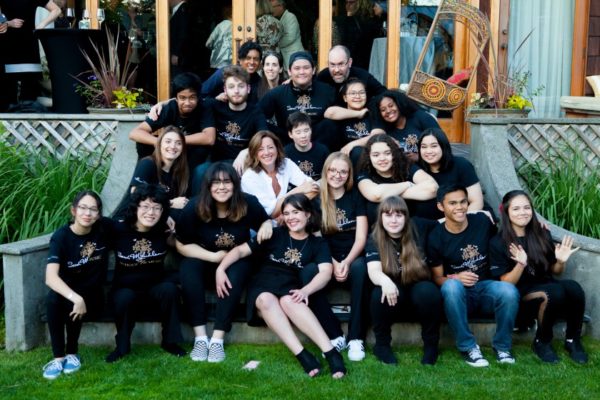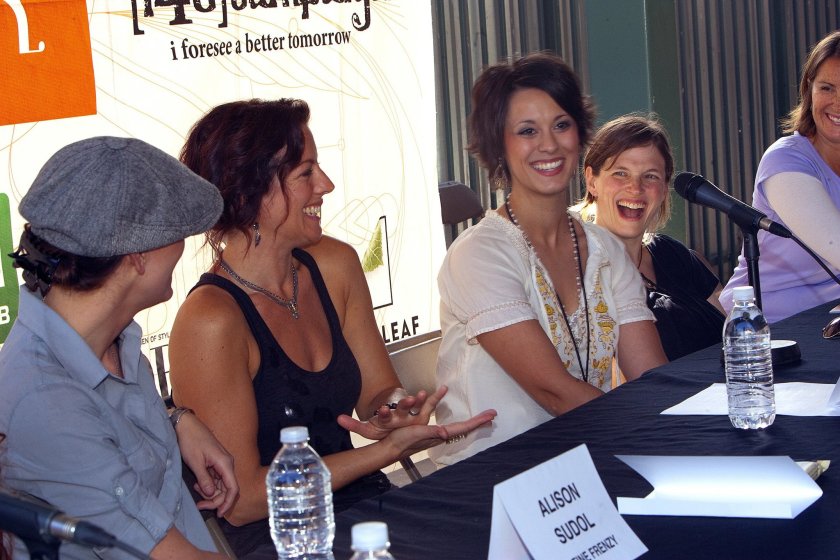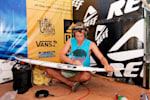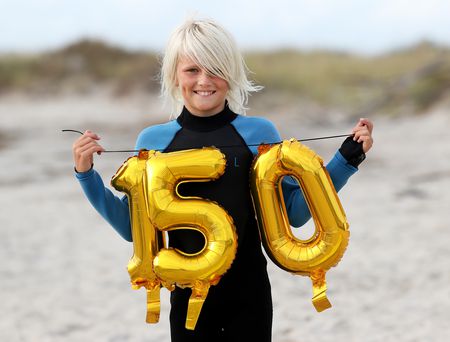How big an impact has Peter Gabriel had on Sarah McLachlan, who performs Tuesday at San Diego Civic Theatre?
So big that the Lilith Fair festival founder can readily cite specific Gabriel song lyrics, from both his lengthy solo career and from his earlier days as the lead singer in the English art-rock band Genesis in the late 1960s and first half of the 1970s.
So big that the middle name of one of McLachlan’s two daughters, Rael, was inspired by the name of the Gabriel-sung protagonist on the 1974 Genesis concept album, “The Lamb Lies Down on Broadway.”
So big that, well, let’s have this veteran Canadian singer-songwriter expound on Gabriel herself.
“He is my singular hero!” McLachlan said, speaking by phone recently from her home in Vancouver.
“I studied him. I studied everything about him, his music and lyrics, and why it makes me feel the way it does. I want to make other people feel the way he makes me feel with his music. It started with his solo career. But, of course, I went back and bought all the Genesis records, including ‘The Lamb Lies Down on Broadway.’ That album had such great storytelling; it was the arc of the songs on it that got to me and the ‘radical-ness’ of the Rael character.”
In 1989, McLachalan recorded her version of Gabriel’s 1977 solo debut single, “Solsbury Hill” as the B-side to her second single, “Steaming.” Her 2007 compilation album of her favorite songs, “Influences,” opens with Genesis performing “The Lamb Lies Down on Broadway.” It also included her version of Gabriel’s 1986 hit, “In Your Eyes,” which was memorably featured in the 1989 film “Say Anything,” directed by San Diego’s Cameron Crowe.
McLachlan has recorded with two Gabriel band veterans, bassist Tony Levin and drummer Jerry Marotta. Her current tour with multi-instrumentalist and singer Vanessa Freebairn-Smith features their version of Gabriel’s 1986 song, “Mercy Street.”
Yet, beyond his enduring musical influence, McLachlan also credits Gabriel for teaching her an invaluable lesson about how to interact with her fans.
It’s a lesson he unknowingly imparted to her when both of them were recording in 1990 at U2 producer Daniel Lanois’ studio in New Orleans. Gabriel was an international star. McLachlan was near the start of her career. She was tongue-tied. He was down to earth and gently encouraging.
“You know how people say: ‘Don’t meet your heroes?’ Well I got to meet Peter when I was 21, and he didn’t disappoint,” McLachlan said.
“It was such a valuable lesson for me. I was just starting out and was in New Orleans, working on my second record. I was in the attic studio and Peter was recording downstairs in the main studio. He walked into the shared kitchen, and I nearly dropped my beer! I said: ‘Hi.’ He said: ‘How are you?’ I said …”
McLachlan laughed.
“God! I could barely form a sentence!” she recalled.
“Then, he said: ‘How’s your recording going?’ I said: ‘Really slow.’ He said: ‘Mine, too.’ And then he said: ‘Good luck with that.’ It was so valuable for me. Because he was my hero, and I felt a bit terrified in his presence.
“All I could hope was: ‘Say something intelligent to him. Please!’ The way he interacted with me was such a gift. Because, later on, I learned what that feels like when fans come up to me and burst into tears or cannot form a sentence, and I remember (my experience with him). I just give them a hug, and say: ‘It’s OK’.”

Sarah McLachlan, at center in white blouse, is shown with students from the free music school she heads in Vancouver. The school also operates in two other Canadian cities. “I’m incredibly proud of the schools,” McLachlan says.
(Photo by Kharen Hill)
The Sarah McLachlan School of Music
McLachlan and Gabriel also share one other trait — sharing music that is not their own, although in distinctly different ways.
In 1980, Gabriel founded WOMAD (short for World of Music, Arts & Dance), an international festival now in its fourth decade. The most recent edition was held over four days last July in Malmesbury, England. In 1989, Gabriel founded Real World Records, a label devoted to showcasing standout musicians from around the world.
In 1997, McLachlan founded Lilith Fair, an annual festival that exclusively featured women solo artists and bands led by women. It thrived for three years, raised $10 million for various charities, was revived for another edition in 2010, but has been dormant since then. McLachlan now sounds open to to another chapter, if not quite ready to make any announcements. “Lilith would be great to do again,” she said. “But that’s all I have to say on that right now.”
Country-music star Miranda Lambert, who performed as part of the 2010 Lilith Fair tour, is quick to sing McLachlan’s praises.
“Sarah was so gracious and that tour was very inspiring with all of women on the bill,” Lambert told the Union-Tribune recently. “Everyone brought something different to the table and its was awesome to watch.”
In 2011, McLachlan teamed with the Wolverton Foundation to found the Sarah McLachlan School of Music in Vancouver to provide free music education to at-risk and vulnerable youth, from toddlers to high school students. In 2016, she opened additional schools in Edmonton and Surrey. All three operate under the motto “Find your voice.” They also offer free ukulele classes for adults, 55 and older.
“I’m so proud of the school,” McLachlan, the mother of two teenage girls, said.
“Part of my pride and joy of being part of this is getting to give kids the opportunity, not only to have great music education, but also to have mentorship and a place where they can be themselves and explore who they are — and who they want to become — in a safe environment.”
And how are her nonprofit music schools funded?
“I put all the money I made from Lilith, basically, into the foundation so that we can continue to give back,” McLachlan replied. “Lilith really instilled that in me, that we have the ability to give money away, locally, to charities, or match the money we raised. We got over $10 million in three years, so extending Lilith’s legacy for kids to learn music is a wonderful thing …
“It’s not necessarily about sending kids from our school to Berklee or Juilliard, although that has happened. It’s about kids learning about themselves themselves — through expression and through peer-to-peer and peer-to-mentor involvement — so that they can have longtime stewardship of their emotional state and their ideas, whether it’s to write songs, do video production, play in a band or whatever, we can give kids all these great, multifaceted opportunities.”
McLachlan is a classically trained musician. Is there anything she experienced as a music conservatory student growing up that she has applied — or decided against applying — at her music schools, be it an overall approach to music education or something very specific?
“Yeah, rigidness,” McLachlan replied.
“As much as I have an appreciation for the structure that was provided to me from classical (music training), and what I was taught, I always found it challenging to keep coloring on the lines. I always wanted to improvise and try new things, and I always got my hand slapped. ‘You can’t do that! You have to do what’s (written) on the page.’ I would respond: ‘Well, I don’t want to do what’s on the page!’ So, when I started my school in Vancouver, part of the curriculum was to look at other ways of teaching that weren’t so structured, especially for beginning (students).”
McLachlan is now at work on her first album of new songs since 2014’s “Shine On.” Her passion for creating and performing songs is perhaps matched by only one other activity, albeit an avocational one.
“I learned to surf 22 years ago and surfing became the second best drug in the world for me. It still is, apart from music,” said McLachlan, who learned to ride the waves from a friend at Trestles, near San Onofre. “I spent 11 days in Mexico in January; we do surf trips there every year with a bunch of girls and whole families. And I live on the west coast of Vancouver Island in the summer so that I can surf every day.
“I love sitting on the board in the water and waiting. I’m not very chatty. I just want to sit and stare, and be in the moment. One of the beautiful things about surfing is, when you catch the wave, you are wholly engulfed in that moment and there is nothing else you can do.”
In a 2010 Union-Tribune interview, McLachlan discussed her then-new album, “Laws of Illusion,” saying at the time: “It’s taken seven years to make this album because I have two small kids and I find it difficult to make time to give music the attention I used to. But the desire and feeling is the same. So, definitely, writing these songs is helping me get these emotions out, and also singing them. Singing, in general for me, has always been a great form of emotional release. I love these songs and am really proud of them. I’m looking forward to playing them on this tour.”

Sarah McLachlan (second from left) is shown in San Diego at a press conference prior to the 2010 Lilith Fair festival show here. San Diego singer-songwriter Ashley Matte is seated in the center, immediately to McLachlan’s right.
(Nelvin C. Cepeda / Union-Tribune photo)
Then and now
McLachlan is now at work on her first album of new songs since 2014’s “Shine On.”
Apart from her daughters being older, how much more (or less) difficult is it for her to make time to write and record her music now?
“It’s exactly the same!” she said, laughing.
“I would argue that’s it’s actually more challenging now, because I’m in the process of changing the organizational structure of my foundation and music school. Plus, l am also the principal fundraiser of the music school, and we have a a significant annual operating budget.”
McLachlan laughed again.
“By the end of making a record, I rarely have any objectivity left,” she noted. “When I wrote ‘Angel,’ I vividly remember telling a friend: ‘The rest of this album (1997’s ‘Surfacing’) is sh-t, but I like this song!’ And it was my most successful album ever. That happens. I tend to lose all my objectivity and I can’t tell if any of it is good.”
McLachlan’s fellow Canadian-born troubadour once noted that, as a young musician, he would write at least one new song every time he learned a new chord. That was not the case for the conservatory-trained McLachlan.
“I knew a lot of chords going in!” she said. “If anything, that was a hindrance, because I was writing songs with 15 to 20 chord changes. I was trying to write mini-symphonies, with all these inversions. I still struggle with that.
“I think about that really great songwriter who wrote — oh, early menopause! — help me, who wrote ‘Learning to Fly’.”
Tom Petty.
“Yeah, Tom Petty. Here was a guy who could write great songs with three chords. It’s hard for me to simplify my songs, because that classical stuff I learned leaks in all the time. So I try to simplify. I think: ‘OK, how can I write a song where the verse is the same as the chorus, in terms of (the) chords.’ And I can’t do it!”
An evening with Sarah McLachlan, featuring Vanessa Freebairn-Smith
When: 8 p.m. Tuesday
Where: San Diego Civic Theatre, 1100 Third Ave., downtown
Tickets: $36.50 to $86.50, plus service charges
Online: ticketmaster.com





Recent Comments